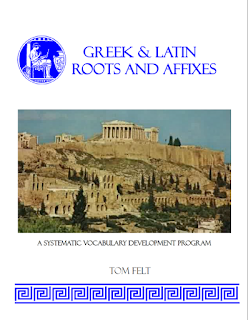Orphaned Words?
Students Adopt a Word!
Here's this cool new gizmo for printing a word onto (what looks like a) washer and making that into a bracelet or necklace. I think the intent is to be mindful and use it for some sort of gratitude exercise. But what if each student chose a cool, exotic word (cacatory, bamboozle, diffibulate, egrote) that's fast fading from the lexicon, and adopt it? Promise to use it and bring it back to the vernacular? How cool would that be? Thoughts? From MyIntent:
Followers
Showing posts with label Vocabulary/Word Study. Show all posts
Showing posts with label Vocabulary/Word Study. Show all posts
Tuesday, April 3, 2018
Monday, March 12, 2018
Newest Work Book
English is so confusing! Is it flaunt or flout? Peak or pique? Loath or loathe? I know lots of educated adults who have trouble with similar sounding words. Here's a great resource that provides opportunities for students in grades 6-12 to recognize the most commonly confused words and homophones in English. There are currently seven units in the work book, with five sets of problem words, like flaunt/flout, discreet/discrete, whose/who's, etc. The workbook comes with a set of PowerPoints to introduce the words visually and orally. The exercises provide reading practice of high-level complexity and utilizing context clue skills. Also great for developing higher-level vocabulary. Check it out at my store at Teachers Pay Teachers.com. There is a free sample of unit one on contractions vs. pronouns.
Monday, February 12, 2018
Word!
Vocabulary! Vocabulary! Vocabulary! It's all about the words, the building blocks of language. Students with larger vocabularies understand better what they read and write more fluently with greater precision and depth. Vocabulary study is the first line of offense in helping your students excel in language arts. Research shows us that the lack of vocabulary acquisition in early education has a tremendous impact on later learning (30 Million Word Gap). Direct instruction of grade-level appropriate vocabulary, word study (roots & affixes), and effective use of context clues should be the corner stones of any language arts teacher's instructional modality.
Roots & Affixes
If students know something of the bits and pieces from which a great many English words are comprised, then when they encounter a new word they are better prepared to analyze its parts to formulate definition of the whole. Try Greek and Latin Roots & Affixes from Fletopia Press. Seven units chocked full of high level exercises, complete with PowerPoint presentations of the roots and affixes fro each unit so that you can present them visually and orally. You can try it out Unit 1 for free.
Context Clue Strategies
Students need to be given the tools to determine the meanings of words in context. In addition to recognizing the roots and prefixes/suffixes from Greek and Latin, recognizing textual clue is the next most important tool in developing higher reading comprehension. Feltopia Press offers a context clue package of four exercises that will provide your students with high-level practice of this important skill.
Roots & Affixes
If students know something of the bits and pieces from which a great many English words are comprised, then when they encounter a new word they are better prepared to analyze its parts to formulate definition of the whole. Try Greek and Latin Roots & Affixes from Fletopia Press. Seven units chocked full of high level exercises, complete with PowerPoint presentations of the roots and affixes fro each unit so that you can present them visually and orally. You can try it out Unit 1 for free.
Context Clue Strategies
Students need to be given the tools to determine the meanings of words in context. In addition to recognizing the roots and prefixes/suffixes from Greek and Latin, recognizing textual clue is the next most important tool in developing higher reading comprehension. Feltopia Press offers a context clue package of four exercises that will provide your students with high-level practice of this important skill.
Subscribe to:
Posts (Atom)



